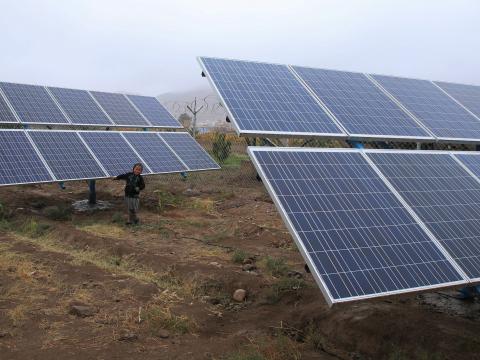There’s No Place Like Home: A Simple Solution Keeps Villages Intact

Habib, 40, opens the door to his garden. Two black solar panels sit in the corner facing the broad expanse of sky, converting sun rays to energy to extract drinking water from the ground. Habib’s solar pump is helping the 426 families of Takab-Esmail to weather the drought that has already forced so many Afghans from their homes.
World Vision Afghanistan (WVA), with funding from World Vision UK, has responded to water shortages by constructing solar-powered drinking water networks in the villages of Takab-Esmail and Shurab, in Badghis Province. Both networks are equipped with solar-powered submersible pumps capable of accessing water at depths of up to 90 metres.
The communities were selected based on the need for immediate drought relief and through consultation with community representatives and government departments.
The prolonged dry spell which began in the 2017-18 season has triggered stress and shock amongst communities due to severe shortages of water; thousands have fled either to the provincial capital Qala-i-Naw, or further west to Herat city, capital of neighbouring Herat province.
Habib says that all of the shallow wells in his village have dried up completely. None of the original sources yields any water. Fortunately, he had dug a deeper well in his garden even before the drought. Women and children could come to collect water for their families. “I opened my garden door to the villagers from 8 a.m. to 5 p.m. and allowed them to fetch water for free.” He adds that the drought eventually affected water levels in his well, limiting the overall supply.
The community’s secondary water sources are mountaintop springs which have also dried up, forcing mostly women and children to travel long distances to ask for water from neighbouring villages. An average trip would require at least six hours to access water that may or may not be safe. According to Habib, “Around 10 families from the village left for Herat Province in search of water and food.”
The lack of local availability and access to clean water has exacerbated the already dire food security situation and this has seen the Global Acute Malnutrition rates rise, exceeding the emergency threshold. The results from the WV Mobile Health Team's screening exercise in the month of March revealed that of the 407 children-under-five screened, 17 were Severely Acutely Malnourished (SAM) and 72 Moderately Acutely Malnourished (MAM).
In response to the severe drought conditions in Badghis Province, WVA also conducted a WASH rapid needs assessment in March 2018 to determine the level of need relating to WASH in one of the most severely affected yet under-served locations. The rapid assessment found that 91per cent of respondents stated that they or someone else in their household had experienced diarrhoea or stomach problems in the last two weeks.
The new World Vision water infrastructure has increased community access to safe drinking water. A network of stand taps brings clean water within reach of targeted households. Habib says that “More people in the village would have fled if we had not received water during the drought.” Access to drinking water during this very challenging period has managed to keep families in their homes and out of the gravely overtaxed Internally Displaced Peoples (IDP) camps.
In order to ensure the smooth, sustainable operation of water networks, the project team partnered with community shuras to form gender-balanced water management groups and trained them on water system management. Three people from each community were selected and trained by World Vision’s technical team on the maintenance of the water networks. Habib is clearly pleased with the developments. “This system is ours now,” he says, smiling from ear to ear. “Everyone in the village is taking care of it as if they own it.”
World Vision also devoted time to training members of both communities in best practices of hygiene and sanitation. So far, 25 members of each village have received the training, and many members are actively involved in promoting awareness within their communities.
Habib speculates that his village might have been a virtual ghost-town by now without the intercession by WVA. “I was also thinking of leaving,” he admits, “but assistance came to us…at exactly the right time.”